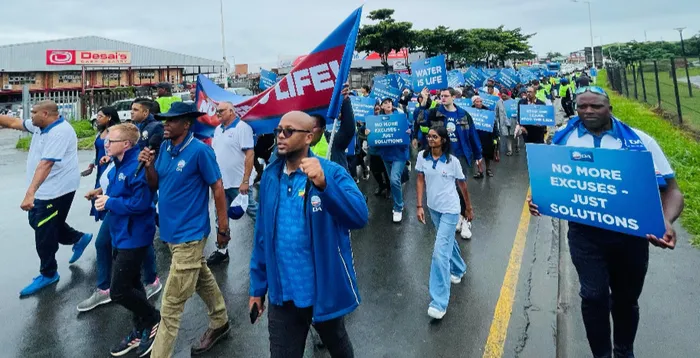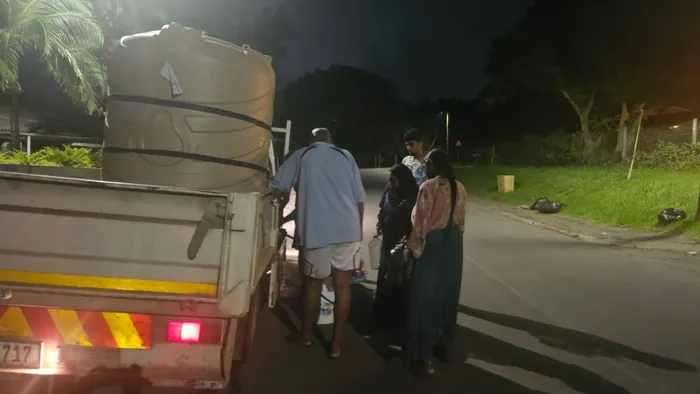KwaDukuza residents protest against water tariff increases amid ongoing outages
"The lack of water tankers is also a stark reality, despite the municipality's claims of having a fleet..." said a resident

Democratic Alliance leaders, together with civil society organisations and residents of KwaDukuza, marched to the offices of the iLembe District Municipality demanding answers over the ongoing water crisis and protesting against the proposed 13.5% water and sanitation tariff increases.
Image: Supplied
RESIDENTS of KwaDukuza have been struggling with persistent water outages for nearly a decade.
As they face proposed tariff increases, community leaders, residents and businesses have united to demand immediate action from the iLembe District Municipality (IDM).
They said the dry taps had forced them to rely on tankers and boreholes, and fork out hundreds of rand for bottled water.
Residents are now rejecting the municipality’s proposed 13.5% water and sanitation tariff increases expected to be implemented from July 1.
Last Wednesday, scores of residents and civil society organisations joined leaders of the Democratic Alliance (DA), for a peaceful protest. They handed over a memorandum to the IDM calling for solutions for a reliable and sustainable water supply, and to reject the tariff increase.
Sakhile Mngadi, the DA iLembe constituency head, said they were demanding a dignified, sustainable solution to the water crisis that had crippled communities “for far too long”.
“Many areas in iLembe have suffered persistent water outages, often going days or even weeks without reliable access to clean water. This is a violation of the most basic human right and a failure of governance at multiple levels.
“The crisis is exacerbated by outdated, poorly maintained infrastructure and a lack of proper oversight in water delivery. Residents are expected to pay for a service that is either irregular or entirely absent,” he said.
Mngadi said despite numerous complaints and calls for intervention, there had been little to no communication from the IDM on sustainable plans to resolve this crisis.
“Communities have been left in the dark. Our memorandum gives the municipality 14 days to respond with concrete solutions. Failure to do so will result in escalated action, as communities will no longer tolerate being ignored.”
Krsna Sing, the DA iLembe district caucus leader, said the ongoing water crisis was unacceptable.
“I have been advocating for our communities' rights to clean water, but the IDM has failed to deliver. In our built-up areas, despite having infrastructure, the IDM's failure to provide adequate storage facilities means that maintenance work leaves us vulnerable to water shortages. Their inability to budget and spend effectively has resulted in certain areas going days without water, with systems unable to recover in time.
"The current status quo in iLembe is alarming and the daily water-shedding is disrupting residents' lives. The lack of water tankers is also a stark reality, despite the municipality's claims of having a fleet. Rural areas are particularly hard hit, with existing infrastructure lying idle and communities without water,” he said.
Sing said the proposed traffic increase on water and sanitation was a “slap in the face” for residents.
“It is unaffordable and unjustifiable. We reject this and demand a zero percent increase on both. Our community is struggling to make ends meet and cannot bear the additional burden. We call on the IDM to change the billing system on sanitation to consumption-based on actual usage rather than property value.
“Water is life, sanitation is dignity, and our residents are being denied both. We will not stand idle while our residents receive this kind of service. We urge the community to join us in rejecting this increase by signing our petition. Enough is enough. We are tired of excuses. We need action from the IDM now,” he said.

KwaDukuza residents have been battling with water outages for almost a decade and are forced to rely on municipal tankers and private suppliers.
Image: Supplied
Affected
Dev Nundall, a resident of Highridge, said they had been battling with the water outages for almost 10 years.
“We are without piped water at least two to three times a week. When we have planned or unplanned shutdowns, it takes at least 12 hours for repairs to be completed, and about another 12 hours for the reservoir to fill-up. However, residents living in high lying areas can wait up to 24 hours to get water in their taps.
“This water issue is gravely impacting the community. People have to go to work and children have to go to school, but they have to wake up to dry taps and return to the same. It is unacceptable.
“We also have to buy drinking water. I have to buy 10 litres a day, which costs me about R80. The municipality has many tankers. However, they supply the outlying areas that don’t have piped water. While it is understandable, they should redirect the tankers to rate paying residents when we have a water outage. It is only fair,” he said.
Nundall said he believed that the IDM needed a full audit.
“At a recent meeting I told the delegation from the municipality that if they could not fulfil their mandate and supply water to the rate paying residents they should resign. It is time that our communities stand up. Together we can make a difference, or we will continue to suffer.”
A resident of Rocky Park, who declined to be named, said the water crisis had progressively worsened over years.
“The outages occur almost daily and it usually returns during the late parts of the night. However, there have been occasions when we have not had water for two or three days.
“Our daily routines are disrupted. Cleanliness is affected with regards to household chores, cooking, washing clothes and access to toilet facilities. I have three children and some mornings there is no water or the water pressure is so low that bathing and preparing their lunches are hampered.
“We are a family of five and we have to buy drinking water which costs close to R60 for every day we are without water. We also store water in buckets and plastic bottles but when that runs out, we are at the mercy of water tankers which rarely show up on our street,” she said.
The mother added it was not fair to increase the tariff for a service that was so often interrupted.
“An increment is both laughable and upsetting. How do we pay so much for what we get so little of?”
Dino Moodley, a resident of Stanger Manor, said he had installed a borehole on his property due to the water crisis.
“The water outages started about ten years ago and we were left without water for days. I was using, as well as providing neighbours with water from our swimming pool but it was getting too low and the walls were starting to crack.
“I was ‘forced’ to get a borehole, which included carbon tanks, UV lights and a sediment filter making it fully-purified. I also have a tap with a hosepipe outside my home so that residents can come and fill-up. It is really sad to see how our community, especially the elderly, are suffering.”
Moodley said it was “ridiculous” to increase tariffs.
“We are not getting the services, especially water, so why must we pay more? In addition, we have made several suggestions during community meetings with the municipality, but it is not considered. One of which was that KwaDukuza used to have its own water supply from the Umvoti waterworks until it became dilapidated. If they maintained it, the community would not have to suffer,” he said.
Cobus Oelofse, chief executive officer of the iLembe Chamber of Commerce, Industry and Tourism, said: “The uMngeni-uThukela Water increase is 13.5%. However, when you add the levies imposed by the Department of Water and Sanitation, the tariff increase is in excess of 20% for bulk water. In addition, the Consumer Price Index for March was 2.7%.
“Hence, while bulk water has increased in excess of 20%, other costs such as wages have not escalated similarly. Furthermore, the cost of sanitation is not determined by the bulk water price. Therefore, it is unmerited to have a blanket increase for all services based on increased bulk water costs.”
Oelofse said in addition, consumers were made to pay for significant water losses.
“IDM business customers have been plagued by both supply and quality issues. Businesses are tired of poor service delivery and paying for inefficiency. However, this is not limited to the business community. The frustration is real in affluent and poor residential communities.”
The iLembe District Municipality did not respond at the time of publication.
Related Topics: